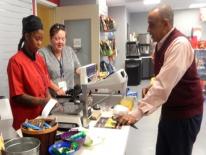
(Right) Bond and Tequisha Sweet know that team success depends on listening to one another, being patient with one another, and looking out for each other and each customer.
Switzer 9 Café: A Leap of Faith
Charlene Bond was born with a visual impairment, but it was a freak accident of shattering windows during a storm that caused permanent nerve damage which left her only able to see silhouettes of people and things. She became a vendor with the Randolph Sheppard Vending Facilities Program (RSVFP) in 1998 for a fresh start, a new life free from the isolation her blindness once held her in. With the program for 17 years, Bond has come full circle, returning to the site where she first began her career a vendor.
(Left) Charlene Bond is committed to providing great service and great food at Switzer Café 9, located at 330 C Street, SW in the Mary E. Switzer federal building.
The Switzer 9 Café, located in the Switzer federal building in southwest D.C., is named in honor of Mary E. Switzer, the former director of the Office of Vocational Rehabilitation within what is now known as the Department of Health and Human Services. The full-service café reopened early in October 2016 after the building had been closed more than a decade for renovations. While remodeling was underway, Bond managed the Seeing Eye Dog Café in Potomac Center Plaza, named in honor of her former companion McKenzie. Excited to be back home, Bond and her team of three-sighted professionals are currently in the menu development stage, providing customers with a variety of hot and cold selections to determine their taste preferences. Her menu refinement process is simple: “I’ll try anything twice; if it doesn’t sell after that, it’s a wrap.” And consumers can feel confident that they are being offered quality selections. ”If I won’t eat it or serve it to my children or husband, I won’t serve it to my customers.”
Her customer service philosophy appears to be paying off. Switzer 9 is bustling between the hours of 7:30 am – 3:30 pm, serving about 400 customers a day, a little more than 10 percent of the building’s employee population. In addition to breakfast and lunch options, the café has a full retail snack section stocked with soft drinks, chips, cookies, granola and other munchies to jumpstart energy levels throughout the day.
Tequisha Sweet has been with Bond since the café reopened. Alternating roles as manager, line cook and cashier, Sweet noted that working with a blind supervisor is no different than working with anyone else. “Ms. Bond knows the work and she knows the team. She makes sure we are prepared and we all look out for each other.” In hiring employees for the facilities she has operated, Bond takes time to observe and to get to know staff, listening intently to determine their work habits and behaviors. She also pays close attention to customer feedback. “I’ve been working blind a long time. I know what it takes to do the job. I don’t ask my employees to do what I won’t do or haven’t done.”
The transition from sight to blindness wasn’t an easy one for Bond; she still encounters a few bumps now and then from people who lack empathy and doubt her ability to maneuver the city or manage a business. “I like my sighted friends, but I need the support and understanding of my blind friends.” Her tenacity and resilience are evident the moment she speaks, “Just because I don’t do things the way a sighted person may do them doesn’t mean I can’t do it.” Her message to people with disabilities is clear: “Don’t be afraid. Step out on faith to achieve your dreams.”
The Randolph Sheppard Vending Facilities Program (RSVFP) was made possible by the Randolph Sheppard Act of 1936 which established the Business Enterprise Program (BEP). The BEP helps people who are blind with business ownership and financial self-sufficiency through the operation of vending facilities on federal, state, and other property. DDS/Rehabilitation Services Administration (RSA) serves as the State Licensing Agency for 35 RSVFP sites in the District of Columbia. RSVFP Program Monitor Jelani Smith works closely with Bond to ensure that Switzer 9 Café meets all business operation regulations and requirements of the Department of Health.


